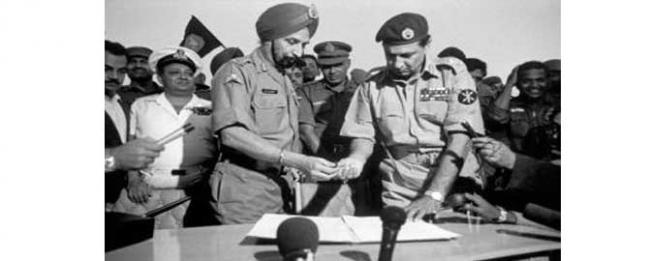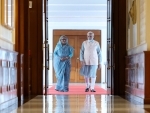Column

ICT issues arrest warrants against two more war criminals of 1971
The country witnessed a systematic execution of intellectuals during the Bangladesh liberation war in 1971 by the Pakistani occupation forces and their local collaborators, most notably the extremely right wing Islamist militia groups Al Badr and Al Shams formed by Jamaat-e-Islami (JEI) and its student organ, then known as Islami Chhatra Sangha. Intellectuals were killed during the entire nine months of the liberation war, but the largest number of execution of intellectuals took place on December 14, 1971, observed as ‘Martyred
Intellectuals Day’.
In 1971, the marauding Pakistani forces and their local agents and collaborators, notably JEI activists, perpetrated inhuman brutalities, killed 30 lakh freedom fighters and raped more than 2 lakh Bengali women. The genocide, war crimes and crime against humanity were committed to “safeguard Islam and its abode
Pakistan”.
Chowdhury Mueen Uddin and Ashrafuzzaman Khan, two ‘butchers of 1971’, were among the ‘most wanted’ persons just after the Bangladesh Liberation War in 1971.Their pictures were published in newspapers published from Dhaka after the victory on December 16, 1971, with a call to capture them. The news papers
termed them ‘butchers’.
Al Badr Operation in-charge Chowdhury Mueen Uddin and Chief Executor Ashrafuzzaman Khan led the force and directly took part in the killing of intellectuals in Dhaka between December 10 and 15 of 1971. There are enough evidence linking the two with torture and killing of at least 18 intellectuals. Nine of them were Dhaka University teachers, six were journalists and three were physicians. Islami Chhatra Sangha, then student wing of JEI, had converted into Al Badr and leaders of the Islami Chhatra Sangha took direct part in the planned
execution of intellectuals to make the nation devoid of merit.
Present JEI chief Maulana Matiur Rahman Nizami was head of the Al Badr high command of Pakistan while JEI Secretary General Ali Ahsan Mohammad Mojaheed was then chief of East Pakistan Al Badr unit. Both Matiur Rahman Nizami and Ali Ahsan Mohammad Mojaheed are now facing trial on war crimes charges. Chowdhury Mueen Uddin and Ashrafuzzaman Khan were among the top ranking Al Badr leaders after Nizami and Mojaheed in order of hierarchy.
Chowdhury Mueen Uddin and and Ashrafuzzaman Khan used to abduct intellectuals and take them to Mohammadpur Physical Training Centre to torture and kill them after taking them to the infamous Mirpur and Rayerbazar killing grounds.
Chowdhury Mueen Uddin who was a journalist working with daily ‘Purbodesh’ before outbreak of the liberation war of Bangladesh, has now been living in London for decades while Ashrafuzzaman Khan is in New York, USA,
News from Bangladesh (NFB) on November 10, 1999 published a report "The Travail of Ashrafuzzaman Khan\'s Infamous Diary" which was later on republished in South Asia Tribune under the heading "Why to read Ashrafuzzaman Khan\'s Infamous Diary". Ashrafuzzaman Khan had compiled a list of the Bengali
intellectuals in his diary for the ‘benefit’ of the ‘high command in the East Pakistan Governor’s House’. It contained particulars of all the intellectuals targeted for elimination. This report showed how in collaboration with the Pakistani occupation forces Ashrafuzzaman Khan had annihilated the intellectuals one by one in keeping with his diary entries. The plan was to kill all the intellectuals to ensure that if Bangladesh emerged as an independent nation, the country would be left with none who could contribute significantly to rebuild
infrastructure of the devastated nation.
After liberation of Bangladesh, Ashrafuzzaman Khan’s photographs were posted in various dailies as "Most wanted fugitive." Later on, a few books on killers and collaborators depicted his picture and the details of his murderous act. This man was directly responsible for killing seven Dhaka University teachers before the
final moment of Bangladesh\'s liberation from the occupational forces. Just prior to liberation of Bangladesh he fled to the US. In early seventies, he was tried in absentia in a Bangladesh court and found guilty of heinous crimes.
Ashrafuzzaman Khan is now living in USA. After publication of the article in NFB, an advocacy group, namely ‘Bangla Nuremberg’ was formed with some dedicated Bangladeshi expatriates. Some of them were living in North America while others were living in Europe.
Thanks to a handful of dedicated expatriate activists in America, soon Ashrafuzzaman Khan became a household name in various law enforcement bodies of USA. This war criminal\'s thirty year old photo along with his present day portrait and his writing samples are in possession of a powerful law enforcement body of USA. The expatriate activists’ groups met Bangladeshi Ambassador to USA and had a few meetings with the Prime Minister Sheikh Hasina to work out extradition of the war criminal to his native land. The Bangladesh Government approached the US authorities asking for extradition of Ashrafuzzaman Khan and all other war criminal who might be living in the United States.



